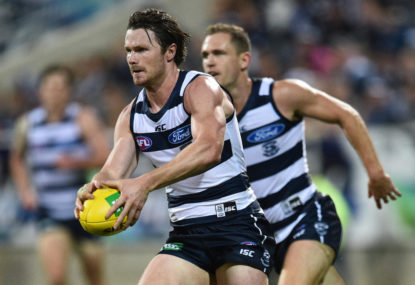Introductory spiels to lists are something between a bad Oscar monologue and a frustratingly resilient bag of chips.
So, comrades, let’s do away with it all and just eat. We start with the AFL’s most sumptuous dish.
See the rest of The Roar’s top 50 countdown
» 50-41
» 40-31
» 30-21
» 20-11
10. Scott Pendlebury (Collingwood Magpies)
This time two months ago, I was riding the Trans-Siberian Express, reading Anna Karenina, with the vast, magnificent desolation of a snow-coated Russian nowhere as my backdrop.
Then I decided I needed to do something more literary. I opened YouTube on my phone and started watching Scott Pendlebury highlight packages.
(Yes, YouTube works fine in Siberia. There is no corner of the world that the Internet does not reach.)
Pendlebury is one of Shakespeare’s sonnets, the concluding medley of Abbey Road, and whatever the best Stanley Kubrick film is. He is not the best player in the AFL, but he is inarguably the most divine.
Time is a measurement for most but it’s a weapon for Pendlebury. An underrated contested ball maestro, he has gradually added a supreme toughness and grit to his ethereal skills and general sublime football existence.
Cam, Ryan and I all had Pendlebury in our top six because we are God-fearing men. Josh had him 11th, which is defensible. Ken did not have Pendlebury in his top 50. Ken and I literally have not spoken since his list was divulged.
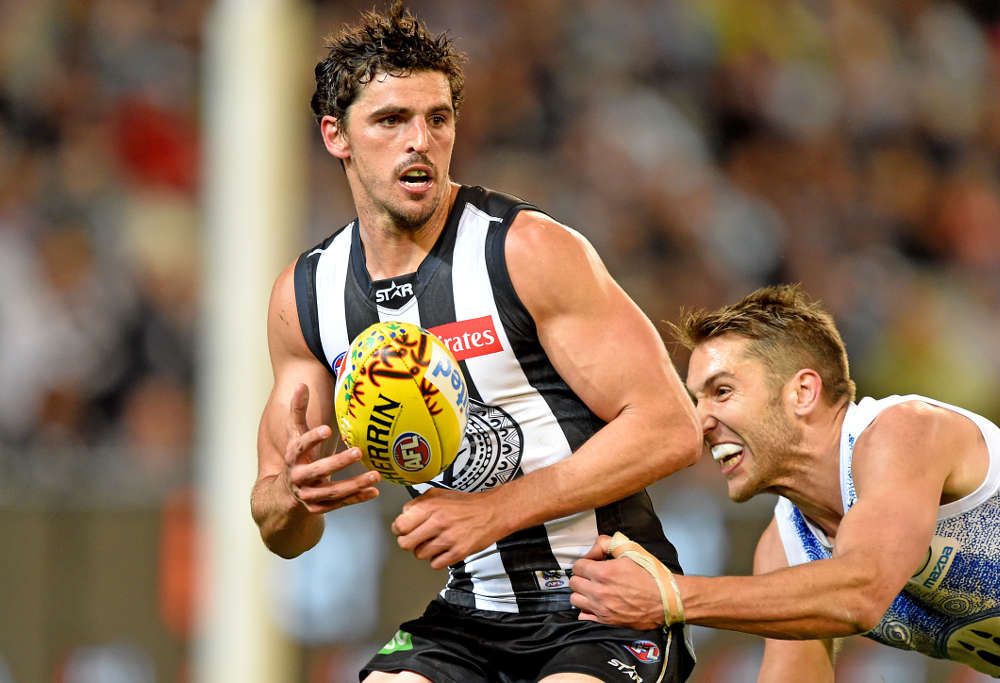
9. Luke Parker (Sydney Swans)
In many ways the anti-Pendlebury: a vicious, unrelenting ball of ferocity, Parker favours devastation over grace.
Second in the league in tackles last year, Parker is the rare perfect combination of mania and technique. He’s an accumulator, and while his disposal isn’t always pristine (third in the league in clangers in 2016), he compensates by hitting the scoreboard with astounding volume for a midfielder.
Last year, Parker belonged to the esteemed 25-25 club (average of at least 25 possessions per game and a total of at least 25 goals kicked), one of only two members, the other being Robbie Gray.
8. Josh Kennedy (Sydney Swans)
There was a period in the second quarter of last year’s grand final where it seemed like Josh Kennedy’s absurd, square frame was going to be powerful enough to crush minor concepts like fate, destiny and the universe all by itself.
Most midfielders excel because of a unique attribute or a mastered nuance. Sam Mitchell is smarter than everyone, Nat Fyfe leaps highest and Patrick Dangerfield accelerates fastest.
Kennedy doesn’t quite fit that mould. He’s just a bigger, stronger, more frightening human than everyone else.
Last year Kennedy was the league leader in contested possessions per game, second in clearances and third in disposals. I had him fourth on this list, higher than anyone else, and consider him the best ‘human’ AFL player, outside of the three aliens at the top.
The grand final was Kennedy’s masterpiece, a game he briefly turned on its head by sheer force of will and muscle. Bulldogs fans will remember that day as a dream, the ultimate dream, but the sight of Kennedy will still, surely, be the hint of a nightmare that almost was.
7. Tom Lynch (Gold Coast Suns)
Two things we know about the next five years of the AFL: GWS will be a premiership dynasty and Tom Lynch will cement himself as the best forward in the game.
In the battle of the expansion teams, Gold Coast has very much been the Inherent Vice – incoherent, spiralling, with fleeting moments of promise – to Greater Western Sydney’s Boogie Nights – a star-studded juggernaut that leaves you breathless.
But the Suns can at least content themselves with the knowledge that between the two clubs, they’ve had the best player of the past five years, and seem poised to have the best of the next five too.
With Gary Ablett Jr sidelined, Lynch has been the only real reason to watch the Suns for the past two years. But he’s been a sight.
Those who will not be named call Jake Stringer ‘The Package’, a moniker that belongs to Lynch. He has everything that you want in a key forward, a rounded athlete who can look up to Wayne Carey and Lance Franklin and not feel compelled to back down.
The game’s best-contested mark, a tireless workhorse and an unrelenting competitor, after 66 goals for a dreadful team last year, the league will watch nervously in 2017 to see what Lynch can do for a team that could flirt with competence.
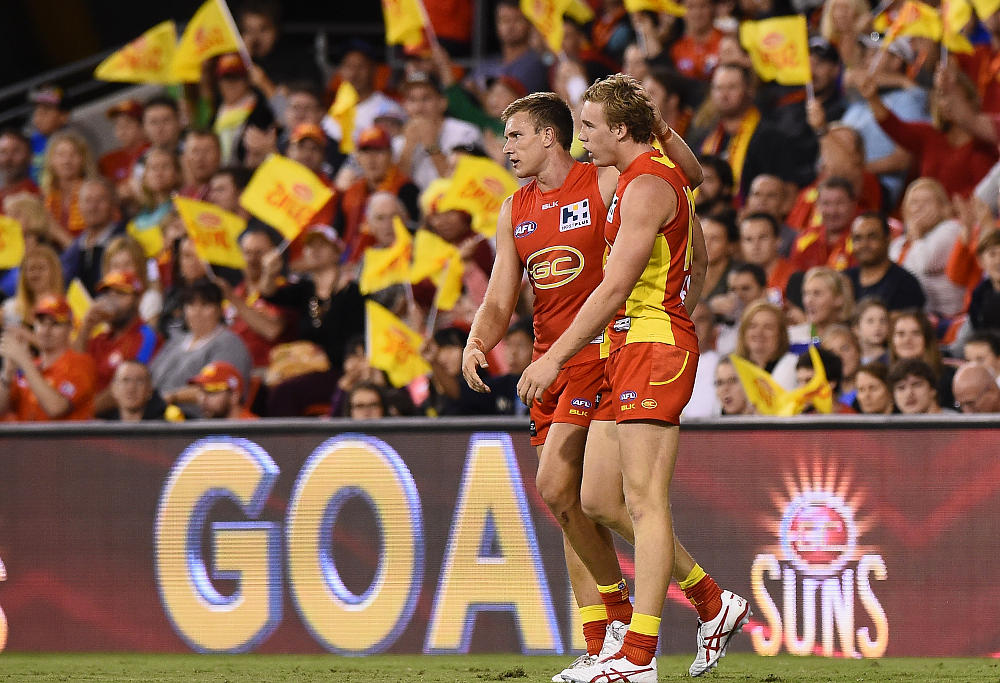
6. Alex Rance (Richmond Tigers)
Outside of the top two on this list, Richmond’s defensive general, spearhead, commander and saving grace was perhaps our most agreed-upon pick for excellence, with everyone placing him between sixth and ninth on their lists.
If Lynch is the complete package defender, then Rance is his defensive mirror. A beast in the contest, with elite closing speed and Matthew Scarlett-type spatial intelligence and decision-making, Rance is the game’s best defender and no one else is close.
A little unlike Scarlett, perhaps, Rance is prone to the occasional head-twitching moment – some bouts of ill-discipline and brain fades, like his final stanza against Collingwood in the Brodie Grundy game last year (remember that one, Cam Rose?). But those rare times, surely, are just the anomalous manifestation of the Richmond disease that Rance, for the most part, has remained spectacularly immune from.
5. Dustin Martin (Richmond Tigers)
Has there ever been a team with two of the six best players (according to us) in the competition that was as aesthetically and existentially dire as the 2016 Tigers?
Rance versus Martin is one of the more fun debates, the AFL corollary to Jack versus Locke on Lost and Keanu Reeves in John Wick 2 versus the field for next year’s Best Actor Oscar.
Rance is a genius and Martin is a monster, yet somehow Martin is the more graceful of the two. His brutality is so brazen, so magnificent, that it can’t help but be beautiful.
He’s an acquired taste, something that you can’t just devour with a spoon. Chopsticks, perhaps, would be the better option.
But when he’s on, he’s glorious; an impossible blend of violence, deft skill and preternatural football intelligence. His greatest weakness – all those shanked kicks – is a by-product of his greatest strength: the desire to take the game on and break it open, an aggressive mentality that his team so often lacks.
4. Marcus Bontempelli (Western Bulldogs)
We might overrate Marcus Bontempelli – a midfielder who has exceeded 30 touches in a game just twice in his entire career – but if we do that’s only a good sign for society.
The Bont is the most understated sporting icon we’ve had in a while. He doesn’t have blinding speed or giant numbers – he’s just a football player, and an almost perfect one at that.
A mountain and a viper, he’s the seamless mix of Josh Kennedy and Scott Pendlebury, with the former’s powerful, towering modern midfielder’s frame, and the latter’s extra-terrestrial perception of time and space. His skills and footwork are immaculate, and in the loudest moments everything seems quiet for him.
A Bontempelli possession might already be the most valuable in the game. When he learns how to accumulate – and he will, don’t worry – he will be unstoppable. It’s only a matter of time before the public’s favourite player becomes the sport’s best.
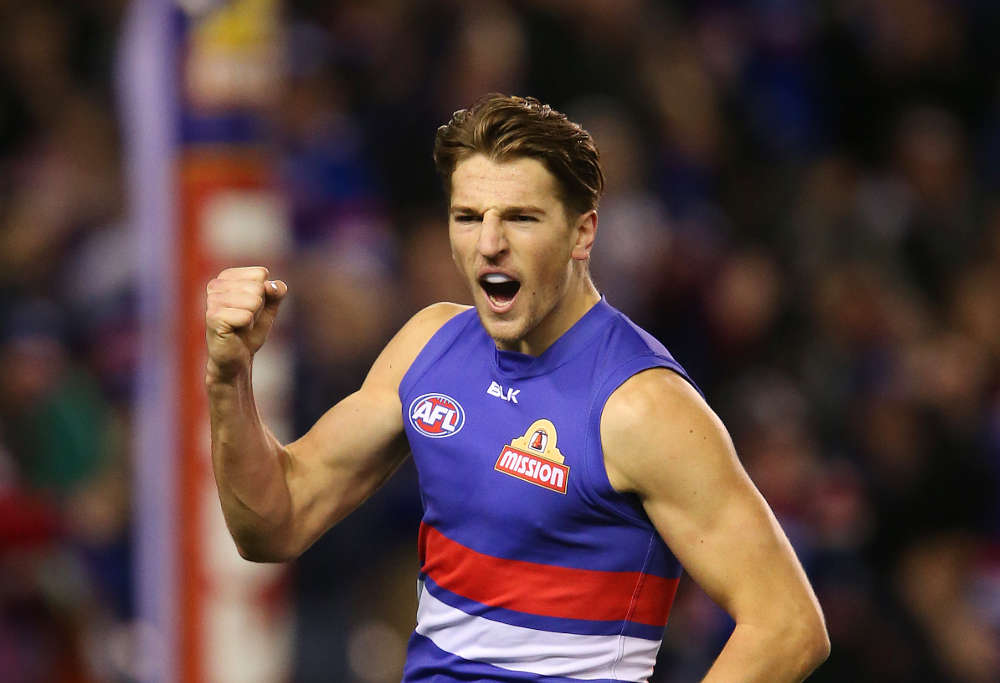
3. Nat Fyfe (Fremantle Dockers)
The forgotten king, Nat Fyfe, remained on the throne at number one on the lists of Josh, Cam and Ryan – measured men with long memories. I had him third and Ken had him 16th.
Unlike the omissions of Pendlebury, Joel Selwood and Sam Mitchell from the entire top 50, Ken has the semblance of an argument in having Fyfe so low. This list is somewhat prospective, and placing Fyfe, a player who is essentially coming off 18 months in the football wilderness, in the top three is a leap.
But then you remember Fyfe’s own leap, and then the ranking seems a lot more grounded.
Nat Fyfe is the most talented player in the AFL. He is the game’s premier athlete, a majestic cocktail of toughness and explosion. No one defies convention and changes what we hold to be true as often as he does. He’s one of the few players in the game who feels like an event all by himself.
2017 has many narratives, but one that every football fan will get behind is Fyfe’s return to transcendence.
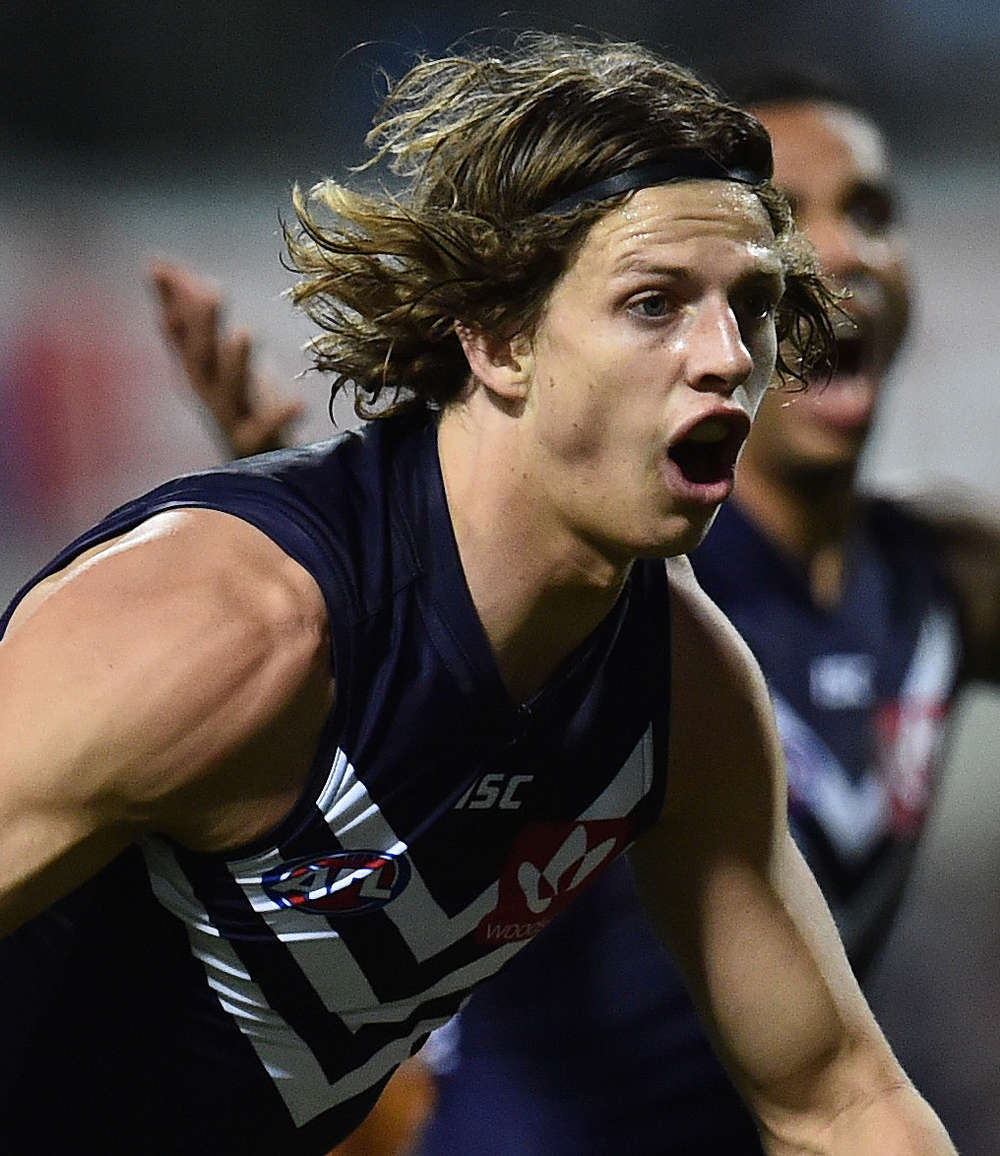
2. Lance Franklin (Sydney Swans)
Still the league’s most cinematic champion, Buddy has a habit, more than any other player, of making a game of football seem like his stage alone.
His 81 goals last season, after a puzzling 2015, saw Franklin reassert himself as the best forward in the game, and one of the season’s two standout players.
He wins games and finals by himself, his joyful destruction of Geelong in last year’s prelim equal parts artful and cruel.
He still, though, doesn’t have the crowning achievement of a dominant grand final performance. That – and perhaps a Brownlow medal that convention will likely continue to withhold from him – is the last box to tick on Franklin’s historical resume.
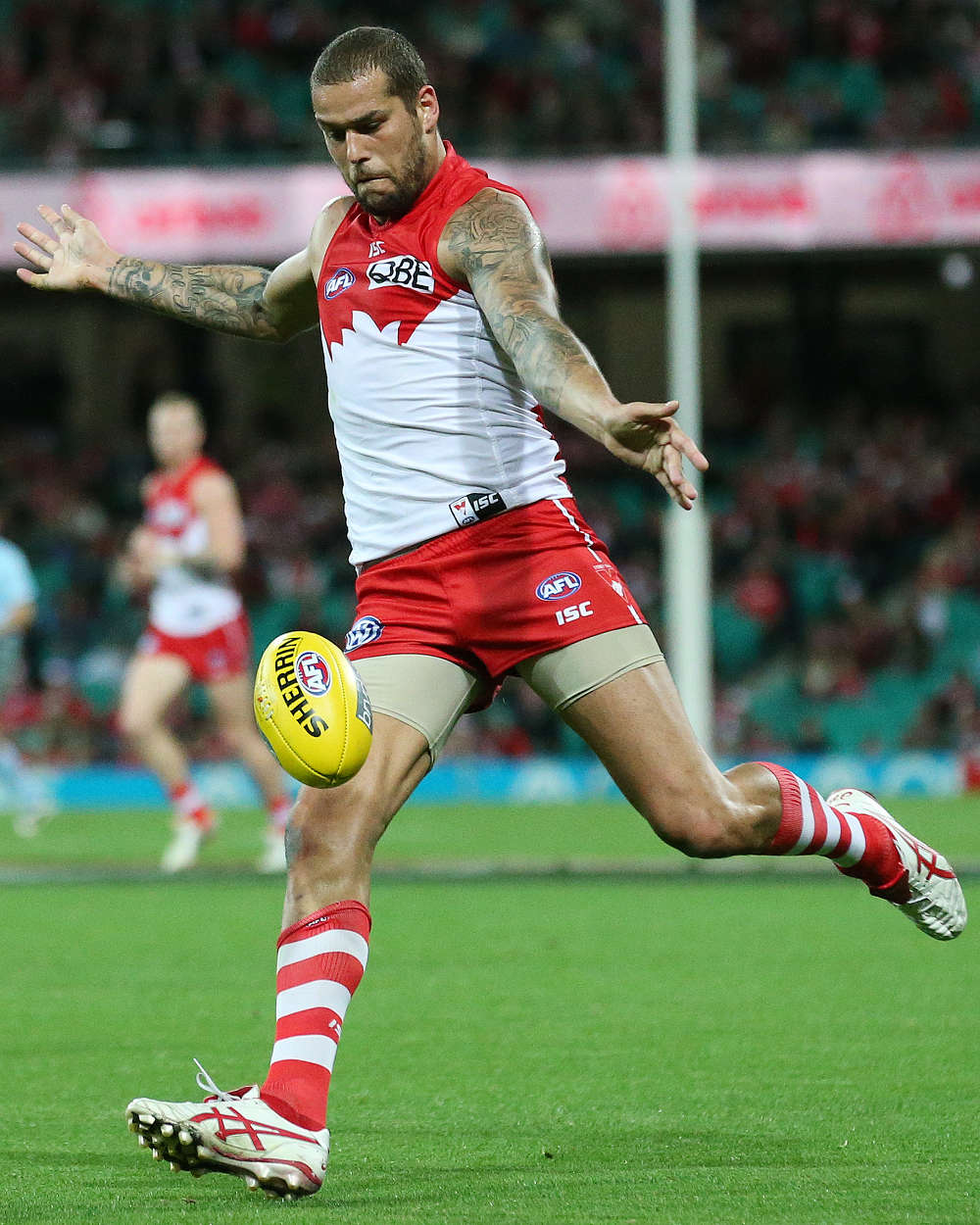
1. Patrick Dangerfield (Geelong Cats)
The athletic and spiritual successor to Chris Judd, Dangerfield comes in at number one, the top choice for Ken and I, second for the others.
The argument for Dangerfield as the game’s best player is simple – alongside Fyfe and Franklin, he’s inarguably one of the top three players in the league, and of those three he’s the surest bet. Fyfe is coming off a serious injury and Franklin is 30.
Danger, meanwhile, is just 26, and has been remarkably durable – he hasn’t missed a game since 2013.
He creates space for himself like no other player in the league, and perhaps no other player in history outside of Judd. In a game of presses and congestion, Dangerfield is the game’s best cheat code.
Like Judd, Dangerfield isn’t an elite kick, but his gift is not delicately threaded passes – it’s generating momentum and driving the ball forward, often violently, on the ground or through the air.
Judd’s freakish pace abandoned him at 25, although injuries were the primary cause. About to turn 27, Dangerfield might not have that many years left with the same absurd, magical explosion. This year, though, should be one of them, so savour it while it lasts.





























































































